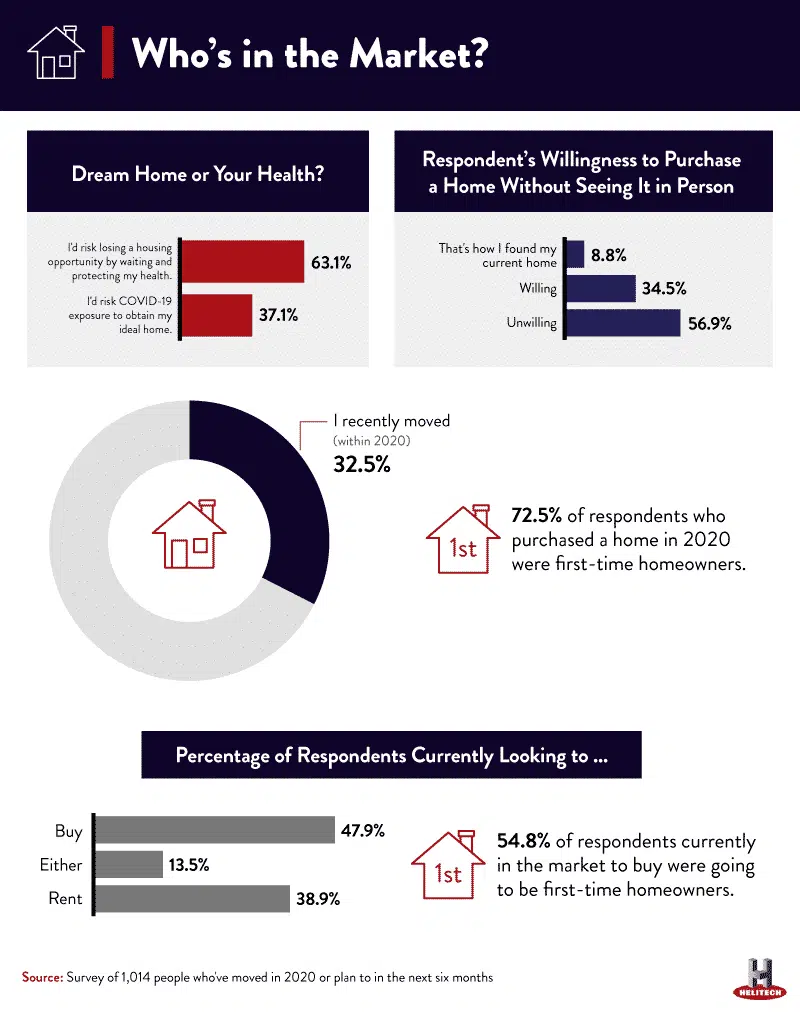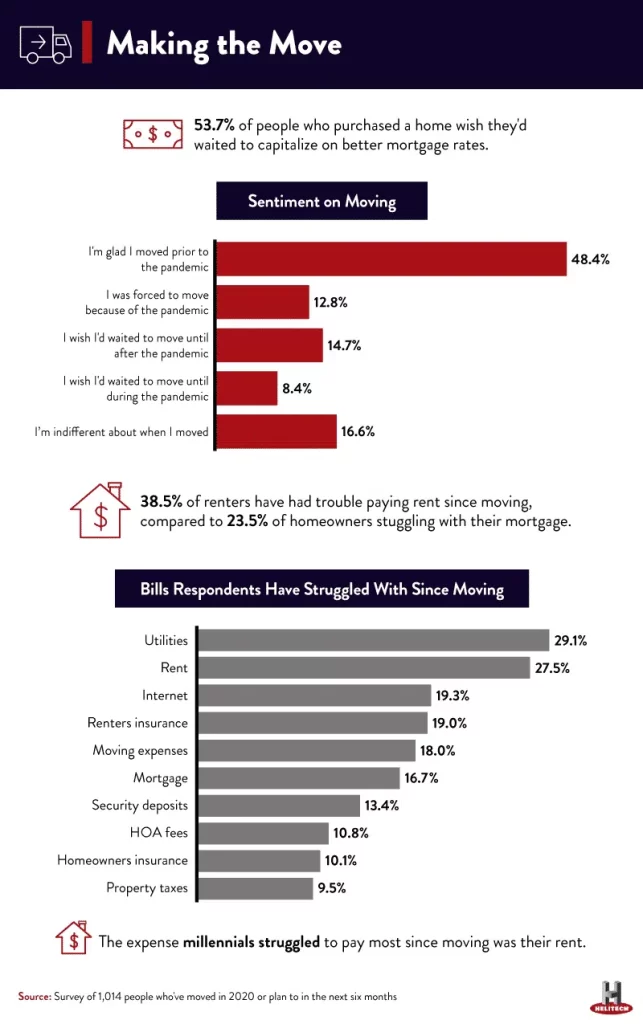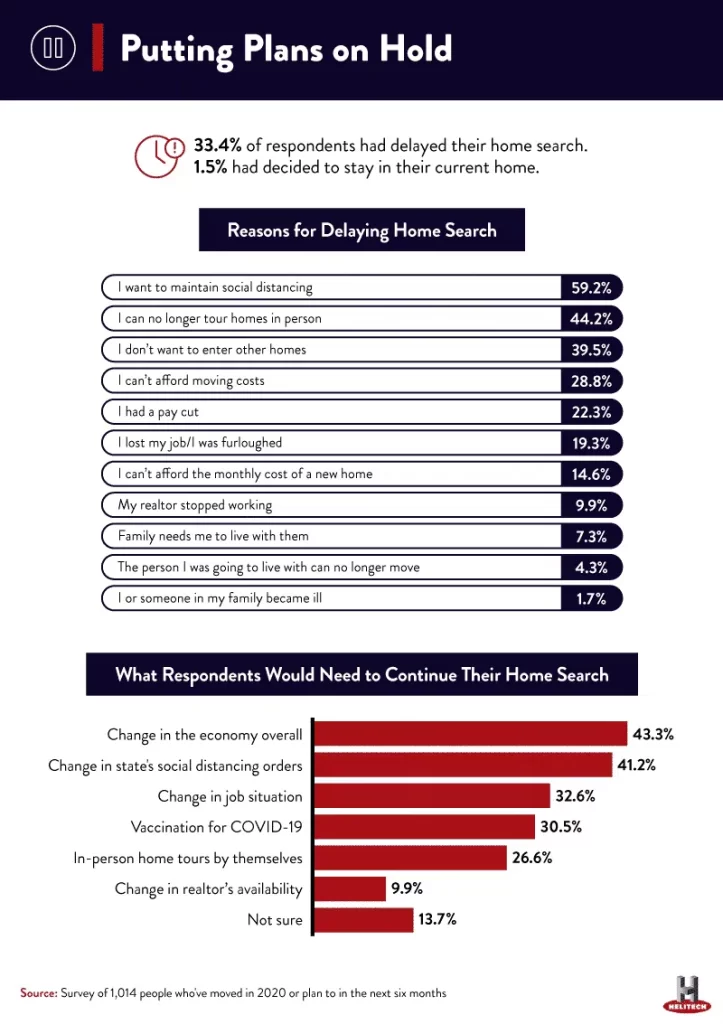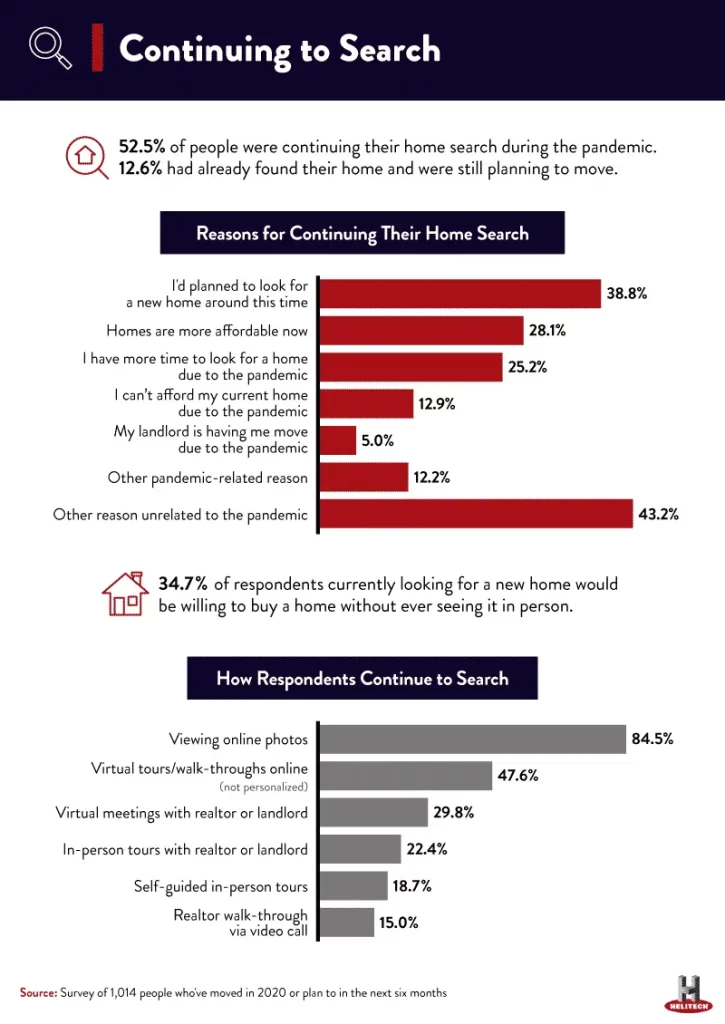
In the last several weeks, the phrase “expect the best, but plan for the worst” may have taken on a whole new meaning. No matter what you were looking forward to in 2020 – going on vacation, getting married, going to school, even just waking up in the morning and going to work – there’s a fairly good chance your plans have changed dramatically.
In reality, as much as we might like to think about a time when we can make plans again without fearing for our health or worrying about social distancing measures, the future is uncertain; the looming possibility of a “new normal” seems more and more evident every day.
But while so many of our plans may have been canceled or put on hold in the first part of 2020, what happens if you were in the process of moving or buying a home? For some families, the threat of a health pandemic can’t stop the need to relocate. For a closer look at buying a home during COVID-19, we surveyed over 980 people who were either in the market to move, were planning to do so before the health crisis broke, or recently purchased a home to understand who’s still planning on relocating, and what the “new normal” for home buying looks like.
You might be able to close on a new home in a month (give or take a few weeks), but you could spend far longer actually searching for the perfect property to buy. As the most expensive purchase many families will make in their entire life, the last thing you want is to rush into the homebuying process and find yourself saddled with buyer’s remorse and no return policy.

And while it’s not uncommon to spend two or three months touring neighborhoods looking at potential homes, the COVID-19 pandemic has changed the way many families are thinking about moving in the first place. While 57% of respondents weren’t willing to purchase a home without seeing it in person, more than 1 in 3 said they’d consider buying a home sight unseen. Even more, 37% were willing to risk getting exposed to COVID-19 if it meant they could move into their ideal home.
More than half of people currently in the market to buy a home identified as first-time homebuyers, and 73% of people who’d recently purchased a home in 2020 were also first-time homebuyers.
When asked about their recent moves, 54% of people expressed wishing they’d waited in order to capitalize on better mortgage rates stemming from the pandemic. While the number of people buying homes may be down as a result of the health crisis, mortgage rates have actually seen a slight increase in recent months.

In contrast, 48% of people were glad they’d moved before the pandemic started, while 13% were forced to move because of the pandemic, and 15% wished they’d waited until after the health crisis had resolved. Compared to 39% of renters who’ve struggled to pay their rent since moving, 24% of homeowners reported struggling with their mortgage as a result of COVID-19. Overall, the most difficult expense to manage has been utilities (29%), which could be due to a number of reasons. Perhaps respondents are paying off larger bills like rent and mortgage payments but being left with insufficient funds to cover monthly utilities.
Even with the option for virtual tours and the possibility of employing social distancing while house hunting, roughly 1 in 3 Americans have delayed their home search, and 1.5% have decided to keep their existing homes rather than look to buy a new one.

The most common reasons people delayed their home search included maintaining social distancing measures (59%), no longer being able to tour in person (44%), and not wanting to enter other homes (40%). Nearly 29% of Americans said they couldn’t afford the cost of moving, and another 22% put off buying a new home because they’d experienced a pay cut.
As the economic climate is continuing to shift, just over 19% of people said they are delaying their home search due to being furloughed or laid off. As unemployment rates in the U.S. more than tripled to 14.7% in April of 2020, it is not surprising people are putting off searching for a new home in such uncertain times.
Forty-three percent of homebuyers needed to see an overall change in the economy before continuing their home search, while 41% were waiting for a change in their state’s social distancing requirements. Nearly 1 in 3 Americans won’t start looking at buying a home again until there’s a change in their job situation.
More than half of Americans in the market to move were continuing the search process through the pandemic, including 13% who found their next home and are planning to move.

The most common reasons for continuing to shop for a home in the midst of the COVID-19 crisis included already having planned to move (39%), the fact some homes were more affordable as a result of the pandemic (28%), and having more time to house hunt as a result of the global health climate (25%). Thirteen percent of Americans were looking for new homes during COVID-19 because they couldn’t afford their existing home anymore.
More than 1 in 3 respondents currently looking for a new home would be willing to buy a house without ever seeing it in person, which could be why so many people are continuing their search by relying on virtual options. A majority of people, 85%, are continuing the home search through online photos, while 48% are relying on virtual tours and walkthroughs instead. In this increasingly virtual landscape, 30% of people looking to relocate have been utilizing virtual meetings with their real estate agent or landlord.
Almost no part of daily life hasn’t been impacted by COVID-19 in recent months and that includes the plans many Americans have been making to move or buy their first home. While many people have put their plans to relocate on hold until it’s safer to tour homes and meet with real estate agents again, some have no choice but to find new places to live, even if it means buying before they ever see the home in person.
At Helitech, we’re passionate about healing homes that have been worn down over time. From water leaking in your basement to cracks or shifts in the foundation, we have over 100 years of combined industry experience to make sure you get the job done right the first time around. Foundation repair and waterproofing can significantly extend the life of your home, making it a space you can love for years to come.
Methodology and Limitations
We surveyed 1,014 people who were in the market to move, had been looking to move before the pandemic, or had recently moved homes in 2020 using Amazon Mechanical Turk.
Survey respondents were 493 women, 491 men, and three reporting as nonbinary. Their average age was 35.1 with a standard deviation of 11.1.
These data are not weighted and rely on self reporting, therefore our study should be considered for exploratory purposes only.
Fair Use Statement
The impact of this global health pandemic affects us all. We encourage the use of our findings or graphics for any noncommercial reuse. We only ask you to please include a link back to this page so your readers have full access to our report and methodology.